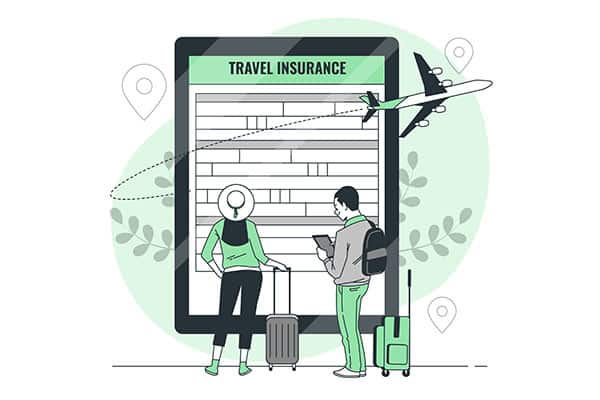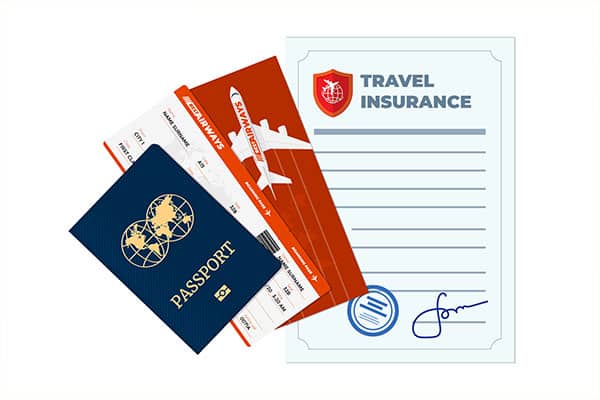Today we explore travel insurance. Traveling overseas can be both exciting and nerve-wracking; one key way to mitigate stress during any journey should be ensuring you have sufficient travel protection – travel insurance provides peace of mind during journeys while protecting against the unexpected.
Travel insurance provides cover for medical expenses, trip cancellations, baggage loss or theft and more – providing peace of mind when something unexpected comes up during your vacation or business trip. Having travel insurance is essential in making any trip worry-free!
All About Travel Insurance
1) Types Of Travel Insurance

There are three main types of travel insurance:
Medical travel insurance – Medical travel insurance provides coverage for any health-related emergencies that arise when traveling internationally, such as hospitalization expenses, surgery costs and treatment of illnesses that might arise while abroad. It can even assist with costs related to medical transportation services.
Trip cancellation travel insurance – This form of insurance provides coverage against expenses related to trip cancellation, such as the costs associated with rebooked flights, hotels or cruises as well as travel rebooking fees.
Baggage travel insurance – This form of travel protection offers coverage for lost, damaged and stolen bags as well as the cost of replacing essential items in case they go missing.
2) Benefits of travel insurance

Here are some of the many benefits of travel insurance:
Travel insurance offers coverage for unexpected incidents: Covering accidents and incidents that arise unexpectedly is another benefit of having travel insurance; these incidents could come up during any trip, even those considered “out-of-the-blue.”
- Can help with medical expenses: Should you require medical treatment during your trip, travel insurance can cover these expenses as well as an emergency evacuation should one become necessary.
- Cover unexpected trip cancellations: In case of emergency or unavoidable circumstances that necessitate canceling your trip unexpectedly, travel insurance can cover the rebooking or cancellation fees incurred as well as non-refundable expenses like tickets or booking fees that might arise from this cancellation.
- Protect Your Valuables: Travel insurance can provide essential protection for the contents of your luggage if it is lost or stolen, covering costs for replacing valuables like cash, jewelry and electronics as well as repairing or replacing it if it becomes damaged.
3) What travel insurance covers

Travel insurance policies cover many things, but there may be certain aspects which they do not. Be sure to research exactly what your policy covers in order to be prepared for any unforeseen incidents that may occur while travelling. Some of the more commonly covered features of travel insurance policies are:
Medical expenses: Travel insurance can provide protection from unexpected medical costs that arise while traveling abroad, such as emergency transportation to nearby hospitals, treatments at emergency rooms and surgeries; it also can cover prescription medication and dental procedures.
- Trip cancellation and interruption: Should an unavoidable event arise that causes you to cancel or interrupt your travel plans, travel insurance can help cover the associated fees, lost wages and other expenses related to it.
- Luggage Loss and Damage: Travel insurance can assist in covering the costs of repairing or replacing damaged or lost luggage, as well as purchasing necessities in case it goes missing or is stolen.
4) Travel insurance tips

Here are a few travel insurance tips that may help you select the ideal policy:
Before purchasing new travel insurance policies, be sure to review existing ones to see if they offer any coverage for international travel; some life policies provide protection for medical costs or trip cancellation.
Before purchasing a travel insurance policy, make sure that you fully comprehend what is covered under your plan and which expenses may require extra coverage from an additional policy. Doing this can help ensure a more informed purchase decision and can prevent unexpected expenses!
Know When to Purchase Travel Insurance: Travel insurance can be purchased anytime during your trip; however, purchasing it closer to the date of travel will reduce its cost significantly. Some travel insurers require purchasing their policy 10-21 days in advance.
5) Travel insurance cost

The price of travel insurance varies based on your type of policy as well as your health and travel history. In general, younger and healthier travelers typically find travel insurance more cost effective, while seniors may need to pay more due to increased health issues; those with preexisting conditions might pay even more than anticipated. You can shop around to compare travel insurance quotes from multiple providers until you find one with affordable pricing that best meets your needs; be sure to read each policy thoroughly to understand exactly what coverage it includes as well as potential out-of-pocket expenses may arise before making your final choice!
6) How to choose the right travel insurance

Take the time to understand each policy’s coverage options and select one that best meets your specific travel insurance needs. There are countless travel policies out there – it’s important to find one that matches up.
Duration: The first step in selecting travel insurance coverage should be deciding the duration of your policy. Will your trip last a month, six months, or one year? As with anything, the longer your trip lasts the more expensive its coverage will become.
- Age: You should also carefully consider your age and any preexisting health conditions you have, such as premenstrual syndrome. If you are healthy and under a certain age threshold, chances are good you’ll pay lower premiums than those who suffer from health issues or are older.
Budget: When purchasing travel insurance policies, keep your budget in mind as premiums may differ depending on what coverage is needed.
7) When to buy travel insurance

Travel insurance should be purchased as soon as you book a trip, according to experts. Waiting until the last minute could leave you missing deadlines and paying higher premiums; travelers who purchase early also have plenty of time to review their policy and make any necessary updates if any are required.
8) How to make a travel insurance claim

Before filing your travel insurance policy claim, ensure you’ve exhausted all other forms of payment. When visiting a doctor overseas, be sure to ask about payment methods and documentation you might require beforehand. Keeping all medical records and documentation will serve as evidence should a claim be necessary.
Accidents or injuries sustained abroad should also be reported to your travel insurance provider immediately. If you need help filing a claim, simply call your provider for instructions – they should be more than willing to guide you through the process! Most travel insurers require claims be filed within a specific amount of time – be sure to read your policy closely to understand this obligation and submit one as quickly as possible.
Also Read – How to Choose the Best Car Insurance for Your Needs
Conclusion
Conclusion Travel can be exciting and fulfilling, yet also be an unexpected source of anxiety and worry if you’re unprepared. One key component to ensure an enjoyable and safe journey is having adequate travel insurance protection against unexpected incidents. Travel policies offer peace of mind against medical costs, trip cancellation fees, baggage loss/theft claims and more so that when something unexpected comes up on vacation you know you will be covered should the unexpected arise. Having travel insurance lets you enjoy your journey knowing if anything comes up that may arise it will be taken care of should anything arise something unexpected happens and give peace of mind knowing should anything arise it will be taken care of – giving you confidence during travel planning!
